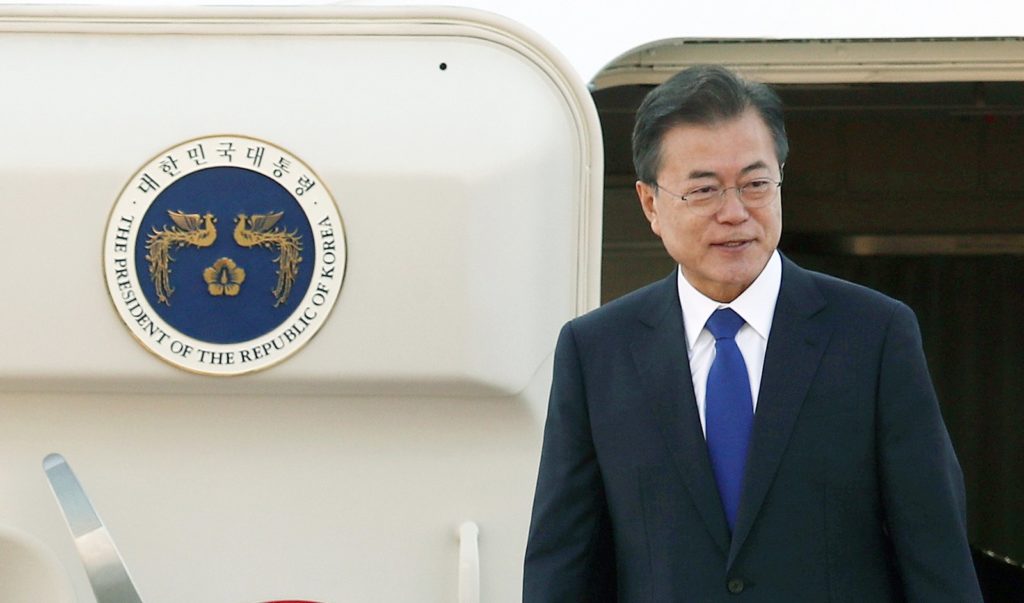The Peninsula
South Korea’s Lonely Task: Jumpstarting Denuclearization Talks, Again

By Yonho Kim
The recent North Korea-Russia summit in Vladivostok drew keen attention from the international society in the sense that it was North Korean leader Kim Jong-un’s first summit diplomacy in the two months since his failed Hanoi summit with President Donald Trump. Obviously, Kim had chance to send a strong signal to Washington that he has alternatives to Trump’s ‘big deal or no deal’ formula by meeting with President Vladimir Putin for the first time. To Kim’s favor, Putin supported North Korea’s phased approach to denuclearization based on confidence-building measures. Another gift for Kim was Putin’s emphasis on multilateral security guarantees, which seems unrealistic for now, for Pyongyang in return for its nuclear disarmament. It is true that Putin failed to provide any public commitment to substantial economic aid and sanctions relief. However, Kim’s overture to Putin put South Korea in a very difficult position when Seoul tries to revive inter-Korean ties and jumpstart the stalled denuclearization talks.
First of all, the timing of Kim-Putin summit was discouraging to South Korea. South Korea hosted an event to celebrate the first anniversary of the summit between Kim and South Korean President Moon Jae-in right after the Kim-Putin summit. To the Moon government’s disappointment, Pyongyang did not respond to Seoul’s invitation. Without North Korea’s participation, the event was held in a modest and quiet tone with Moon joining via video message.
The Kim-Putin summit also reconfirmed that Pyongyang has lost its interest in having Seoul as a mediator for denuclearization negotiations with Washington. Kim basically asked Putin to take over, at least for now, the role of mediator by encouraging him to deliver Pyongyang’s message to Trump. Indeed, in his April 13 speech at the Supreme People’s Assembly, Kim called on South Korea to act as a stakeholder rather than a mediator in the denuclearization talks for the interests of the people of the two Koreas. As long as Seoul is unable to persuade Washington to ease the sanctions blocking inter-Korean economic cooperation, Pyongyang seems unwilling to consider reengaging with its southern neighbor.
Observers in Seoul are paying keen attention to the fact that the issue of security guarantee instead of sanctions relief was publicly raised at the Vladivostok summit. This may indicate that Pyongyang would focus on the most fundamental sticking point, including the presence of U.S. forces in South Korea and U.S. nuclear umbrella, in denuclearization talks instead of demanding sanctions relief which exposed one of their weakest links. If this turns out to be true, the room for the Moon government to play a proactive role will dramatically shrink and the denuclearization negotiations will become a long game.
The Trump administration is persisting with its own version of strategic patience leaving little chance for sanctions relief until North Korea’s denuclearization. Although Trump derided Obama’s strategic patience for allowing the North Korea problem fester, the current stalemate involves no military tension or rhetorical wars. Trump and Kim are even claiming that they are willing to return to diplomacy if the other side would give up and emerge from its own strategic patience. Neither China nor Russia seem to be willing to change the status quo or nuclear stalemate in part because it mitigates their concerns about exclusion from the denuclearization talks. Although Japanese Prime Minister Shinzo Abe offered to meet Kim without conditions to “break the current mutual distrust,” it is unclear whether his conciliatory gestures will be welcomed by Kim.
Moon successfully brokered the historic 2018 Singapore summit and then helped jumpstart the stalled denuclearization talks between the U.S. and North Korea by announcing the Pyongyang Declaration at his third summit with Kim. However, given the tense tug of war between Trump and Kim and the unbearable risks of failed third Trump-Kim summit, it is less likely to see any time soon past pattern of Moon’s constructive role in facilitating U.S.-North Korea negotiations than before. The Moon government has been promoting a comprehensive nuclear deal with a roadmap to an end state involving phased implementations. However, North Korea has yet to respond to Moon’s call for fourth summit with Kim. Indeed, liberals in Seoul reluctantly agree that it might take a considerable amount of time and efforts before starting to see a closing of gap between Washington and Pyongyang. They hope that even while playing the long game, the two sides will stop bickering outside the negotiations and start talks at the working level.
North Korea’s launch of short-range projectiles last week was a slap in the face to a South Korea that has been trying to reduce military tensions and prevent accidental military clashes with the North. The Blue House immediately condemned Pyongyang, arguing that its launch was contrary to the purpose of inter-Korean military accords agreed in the Pyongyang Declaration last year. The launch was also a clear signal that Kim is willing to maximize pressure on Trump to undermine his strategic patience toward North Korea. Kim might be calculating that with the 2020 elections in the U.S. approaching, the last thing Trump wants to see on cable news is derisive news reports on the end of Trump-Kim bromance. It remains to see whether the new developments over the last weekend will provide Seoul with any opening to a renewed role of jumpstarting the denuclearization talks.
Yonho Kim is a Non-Resident Fellow at the Korea Economic Institute of America. The views expressed here are the author’s alone.
Photo from the Republic of Korea’s photostream on flickr Creative Commons.
